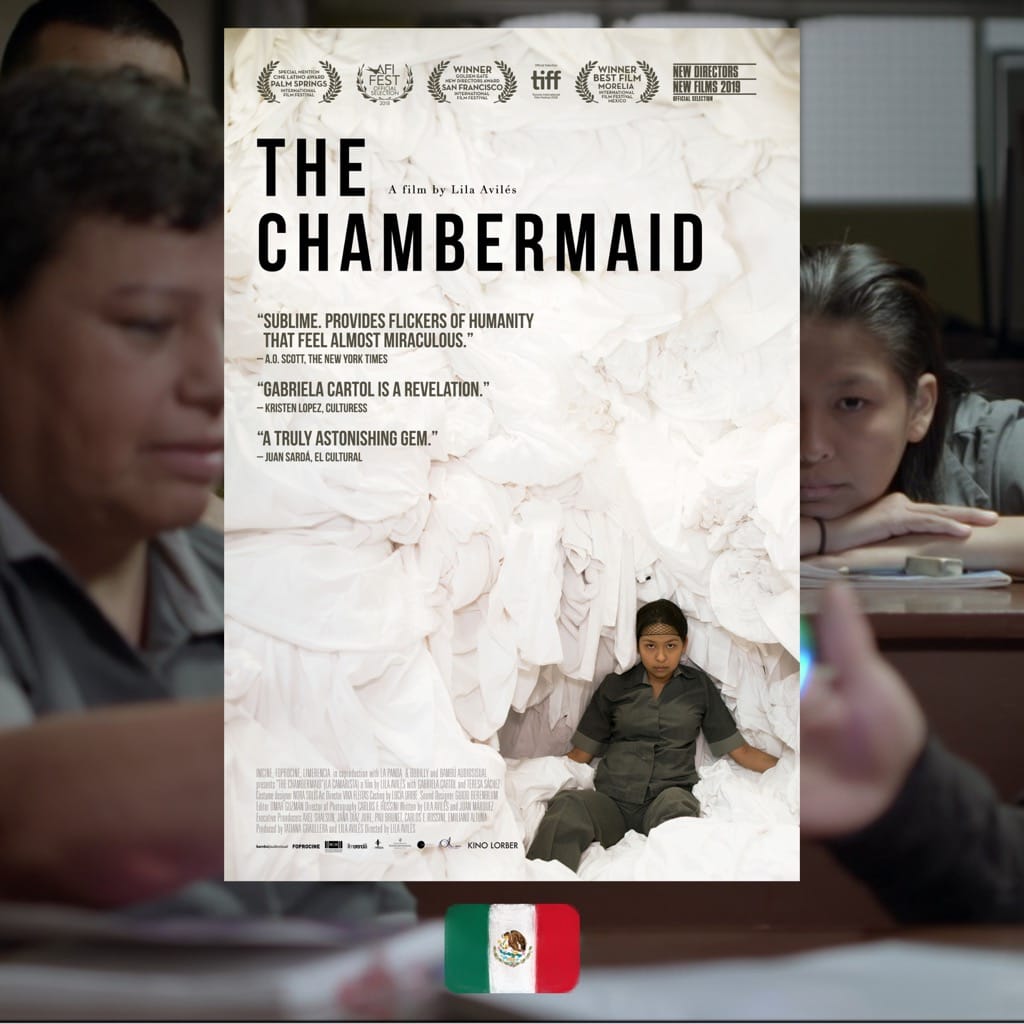Mexico’s nominee for the 2020 Oscars about a young indigenous woman working as a maid at a fancy hotel: a clever, quiet and immersive look at the othering of labor as experienced in the millennial era



FROM MEXICO
WHAT IT’S ABOUT: Eve is a young employee of an expensive hotel in Mexico City. She works hard to provide for her little son, whom she doesn’t always get to see, returning home much later than his bedtime, saves her lunch money, and takes night school classes. Eve’s goal is to get transferred to a newly refurbished, more prestigious floor because that’s supposed to be the next step in the career ladder. Lost in the insular world of the hotel, she has a window cleaner flirt with her, befriends an older prankster Minitoy, and moonlights as a baby sitter for a guest, Romina. As Eve waits for change to come, the monotony of her labor slowly eats away at her consciousness.
WHO MADE IT: Lila Avilés, the director and writer, started as an actor. She has played in various film and TV projects, including the Mexican version of “Drunk History.” “The Chambermaid” is her directorial feature debut, and she co-wrote it with another beginner Juan Márquez. The actors in the film are all relatively unknown but provide some striking performances. Gabriela Cartol, in the role of Eve, is brooding, haunting, with eyes that stage their own drama: genius casting. Meanwhile Teresa Sánchez, who plays Minitoy, and Agustina Quinci, who plays Romina, are both very captivating. I have since seen Sánchez in “My Skin, Luminous,” and she has a fantastic screen presence that mixes bubbly familiarity with a malicious mystery: I hope she gets to be in more films.
WHY DO WE CARE: It’s crucial to see the different types of labor reflected on film, but the spotlight usually favors more visible workers of the service industry. We recently wrote about a film querying the lives of night cleaners, the semi-opaque backbone of our society. Much like them, the hotel maids, who maintain a liminal existence in the dusky corridors and the grey underbellies of hotels, luxurious and not, inhabit a world of identity and class complexities. “The Chambermaid” explores this world through Eve’s eyes, which allows the viewer to become one with her perspective. And this leads to one of the best and most compelling studies of “othering of labor” that I had seen on film. Eve’s repetitive, tedious work, and the lack of rewards it brings, are portrayed with a firm commitment, and the disassociation brought about by the drudgery translates to the viewer’s experience of the film. There is nothing dedicatedly surreal about the film, and yet its narrative starts to feel uncanny, creating an immersion of a menial labor existence. And when experienced, this immersion, while dizzying, becomes a stronger statement on the blue-collar plight than any indignant speech.
WHY YOU NEED TO WATCH: For generations of millennials, “getting ahead” is merely an obscure fiction, which has nothing to do with their own grind, and their situation is even less likely to improve than that of the previous age groups. “The Chambermaid” is a striking, subtle study of this 21st-century melancholy. Co-written and directed by a woman, and with an indigenous actor in the lead role, it makes a Ken Loach kind of narrative into a quiet, searing drama of timeless power. Overwhelmed by the laundry, Gabriele Cartol’s Eve is a vanquished Laocoon in the film’s poster, but unlike the famous Trojan, she seems reluctant to get up. Because besides the glass ceiling that prevents her—poor, indigena, uneducated—from “making it,” there are also invisible systems of power preserved by the gatekeepers—hotel managers and older employees, who all retain their positions with the grip of a member of the political establishment. Some floors are more valuable than others, your career’s growth is dictated by each choice you make, and to stay afloat, you need to participate in the corrupt system of exchanging favors and bargaining labor. These rigid, unaccommodating politics are hard enough to navigate on their own, and make Eve further alienated from reality and her goals. With only the hope that a fancy dress forgotten by a guest will be given to her after not being claimed for a set period and the affection that the enamored window cleaner shows her, Eve finds it hard to stay afloat. And this is precisely where the staying power of Avilés’s film lies: as ambivalent, as powerless as she is after a day’s work, Eve is a fitting, slightly mischievous but profoundly tired face of a whole generation’s woes.
The Chambermaid (La Camarista), 2019
Director: Lila Avilés
For more content like this sign up for our weekly newsletter
WATCH THE TRAILER















